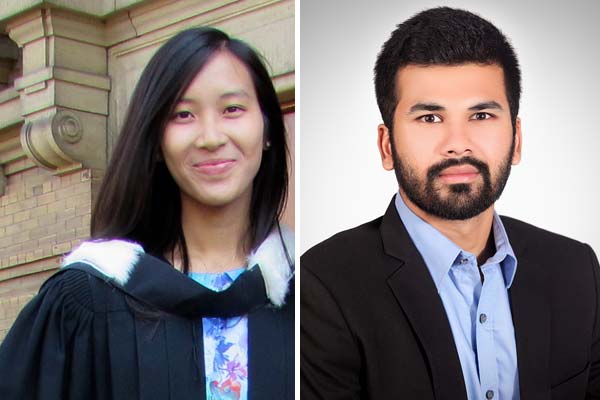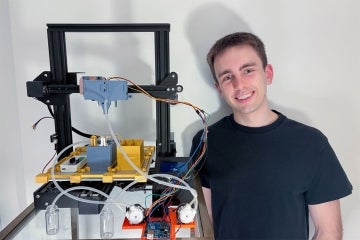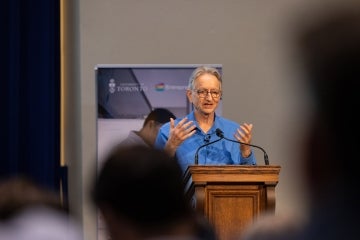
Winnie Lieu and Raghav Singal were both highly commended for their papers
From cancer research to student mindfulness: global Undergraduate Awards recognizes U of T alumni
Published: October 6, 2015
Eight U of T graduates have been named to the Highly Commended list at this year’s Undergraduate Awards – a competition inviting top students from around the world to take part at its Global Summit in Dublin starting November 10.
To be ‘Highly Commended’ a student's research or academic paper must be ranked in the top 10 per cent of more than 5,000 submissions.
U of T students regularly number among this elite group. (Read about more Highly Commended U of T alumni)
This year’s finalists and their categories are:
Raghav Singal - Engineering & Built Environment
Dominic Liao-McPherson - Engineering & Built Environment
Xiyu Liu - Engineering & Built Environment
Misha Boutilier - History
Ira Halpern - Literature Pre-1710
Roshaan Wasim - Literature Pre-1710 & Literature 1710-Present
Dean McHugh - Philosophy & Theology
Winnie Lieu - Psychology
U of T News spoke with a few of the finalists. (Read interviews with Dean McHugh and Ira Halpern.) More stories featuring the great work of other Highly Commended alumni are still to come…
RAGHAV SINGAL
What is your paper about?
The paper discussed multiple methods that can be used to improve the image quality of Cone beam computed tomography (CBCT) scans. CBCT scans are used during radiotherapy treatments in order to evaluate and dynamically plan the treatment. As compared to CT scans, they do not expose the patient to a lot of radiation and therefore are less harmful. However, the image quality of CBCT scans is relatively poor. Professor Dionne Aleman, Professor Doug Moseley and I proposed novel mathematical models that can be used to improve the CBCT image quality.
Why do you care about this subject?
I believe in making the world a better place, and cancer is one of the biggest problems faced by us.
What’s next for you?
I just started my doctoral degree in Operations Research at the School of Engineering and Applied Sciences at Columbia University. It is hard to say where I will end up five years down the road, but academia is a possibility. Regarding areas of research, I am mostly interested in mathematical optimization applied to healthcare, finance, sports and energy.
Any supporters at U of T who helped you along the way?
Professor Dionne Aleman from the department of mechanical and industrial engineering supervised me on this research project. We started in September 2012 and worked on it for almost three years. She was very helpful and patient throughout the project.
How else did you get involved at U of T?
I served as class rep for the Industrial Engineering Club 2013-14 and became the group’s Academic Director for 2014-15. I also served as VP Academic on the Chestnut Residence Council from 2013-14 and as the Council’s Speaker for 2014-15. In terms of volunteering, I provided notes to students with disabilities for over 15 courses.
WINNIE LIEU
What is your paper about?
My research paper was a systematic review that aimed to answer these questions: “How effective are mindfulness practices for university students? How can mindfulness be optimally incorporated to benefit student functioning and learning?”
I wanted to see what research had been done on mindfulness in higher education settings, given that mindfulness has been gaining momentum in university campuses as a method to better address student mental health needs.
Why do you care about this subject?
While it was interesting to read about the importance of mindfulness in research and learn about it in my classes, having an experiential psychology class that guided me through mindfulness exercises was life changing. I highly encourage anyone who has the slightest curiosity to give the practice a try (and try to persist with it afterwards). Speaking from personal experience, practicing mindfulness has helped me be more present in life.
What’s next for you?
Since graduating this year, I have started my master's in occupational therapy at the University of Toronto.
Any supporters at U of T who helped you along the way?
Professor Brenda Toner, who taught me the course PSY408H1 The Psychology of Mindfulness, helped support me while I wrote this paper. Her discussions and insight in class were extremely helpful in helping me learn, practice and evaluate mindfulness. I also want to thank Professor Bill Ju of the human biology department for his continuous support.
How else did you get involved at U of T?
I enjoyed volunteering in hospitals and as a research assistant at CAMH and the Rotman Research Institute. In particular, I extremely valued my volunteer experiences abroad in Taiwan and Guatemala. I was also very involved in the Centre for Community Partnerships at the University of Toronto as an Alternative Reading Week project leader and tutor.



